"Leisure" is a poem by Welsh poet W. H. Davies, appearing originally in his Songs of Joy and Others, published in 1911 by A. C. Fifield and then in Davies' first anthology Collected Poems by the same publisher in 1916.
"Leisure" is a poem by Welsh poet W. H. Davies, appearing originally in his Songs of Joy and Others, published in 1911 by A. C. Fifield and then in Davies' first anthology Collected Poems by the same publisher in 1916.
The poem is written as a set of seven rhyming couplets.
- What is this life if, full of care,
- We have no time to stand and stare.
- No time to stand beneath the boughs
- And stare as long as sheep or cows.
- No time to see, when woods we pass,
- Where squirrels hide their nuts in grass.
- No time to see, in broad daylight,
- Streams full of stars, like skies at night.
- No time to turn at Beauty's glance,
- And watch her feet, how they can dance.
- No time to wait till her mouth can
- Enrich that smile her eyes began.
- A poor life this if, full of care,
- We have no time to stand and stare.
Although it was to become Davies' best-known poem, it was not included in any of the five Georgian Poetry anthologies published by Edward Marsh between 1912 and 1922. Thirty-two of Davies' other poems were.
It warns that "the hectic pace of modern life has a detrimental effect on the human spirit." [1] Modern man has no time to spend free time in the lap of nature.
In his 1963 Critical Biography of Davies, Richard J. Stonesifer traces the origins of the poem back to the sonnet "The World Is Too Much With Us" by William Wordsworth, saying:
"But he went to school with Wordsworth's sonnet "The world is too much with us", and echoes from that sonnet resound throughout his work as from few other poems. Philosophically, no other single poem can be said to form the basis of so much of his poetry. The celebrated opening of his wise little poem "Leisure" has its origins here." [2]
Stonesifer traces the central idea to a number of Davies' other poems - "The Housebuilder" (from the 1914 The Bird of Paradise), "A Happy Life" and "Traffic", as well as "Bells" and "This World".
Davies is generally best known for the opening two lines of this poem. It has appeared in most of the anthologies of his work and in many general poem anthologies, including:
The poem features, in spoken form, on the album Anthology of 20th Century English Poetry (Part I), originally issued in 1960 on the Folkways Records label and has been used in British television advertisements, including those for Center Parcs and Orange Mobile.[ citation needed ]
The poem was misquoted, by the KGB in a 1991 secret message to their spy inside the FBI, Robert Hanssen.
The opening two lines of the poem, sung in English, are also used in the refrain of the song Monakh (Monk), by Ukrainian band DakhaBrakha, from their 2016 album The Road. [4] [5] [6] [ citation needed ]
The term sonnet refers to a fixed verse poetic form, traditionally consisting of fourteen lines adhering to a set rhyming scheme. It derives from the Italian word sonetto. Originating in 13th-century Sicily, the sonnet was in time taken up in many European-language areas, mainly to express romantic love at first, although eventually any subject was considered acceptable. Many formal variations were also introduced, including abandonment of the quatorzain limit – and even of rhyme altogether in modern times.

William Wordsworth was an English Romantic poet who, with Samuel Taylor Coleridge, helped to launch the Romantic Age in English literature with their joint publication Lyrical Ballads (1798).

Dame Carol Ann Duffy is a Scottish poet and playwright. She is a professor of contemporary poetry at Manchester Metropolitan University, and was appointed Poet Laureate in May 2009, and her term expired in 2019. She was the first female poet laureate, the first Scottish-born poet and the first openly lesbian poet to hold the Poet Laureate position.

This article focuses on poetry from the United Kingdom written in the English language. The article does not cover poetry from other countries where the English language is spoken, including the Republic of Ireland after December 1922.
Canadian poetry is poetry of or typical of Canada. The term encompasses poetry written in Canada or by Canadian people in the official languages of English and French, and an increasingly prominent body of work in both other European and Indigenous languages.
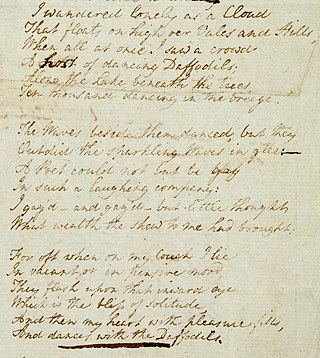
"I Wandered Lonely as a Cloud" is a lyric poem by William Wordsworth. It is one of his most popular, and was inspired by an encounter on 15 April 1802 during a walk with his younger sister Dorothy, when they saw a "long belt" of daffodils on the shore of Ullswater in the English Lake District. Written in 1804, this 24 line lyric was first published in 1807 in Poems, in Two Volumes, and revised in 1815.

William Henry Davies was a Welsh poet and writer, who spent much of his life as a tramp or hobo in the United Kingdom and the United States, yet became one of the most popular poets of his time. His themes included observations on life's hardships, the ways the human condition is reflected in nature, his tramping adventures and the characters he met. His work has been classed as Georgian, though it is not typical of that class of work in theme or style.
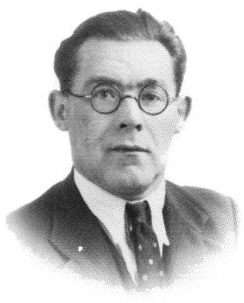
Idris Davies was a Welsh poet. Born in Rhymney, near Merthyr Tydfil in South Wales, he became a poet, originally writing in Welsh, but later writing exclusively in English.
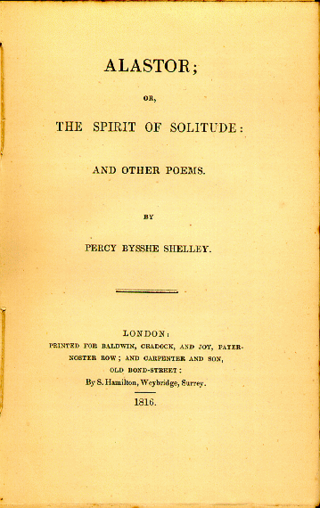
Alastor, or The Spirit of Solitude is a poem by Percy Bysshe Shelley, written from 10 September to 14 December in 1815 in Bishopsgate, near Windsor Great Park and first published in 1816. The poem was without a title when Shelley passed it along to his contemporary and friend Thomas Love Peacock. The poem is 720 lines long. It is considered to be one of the first of Shelley's major poems.
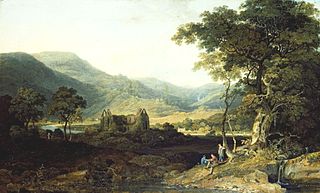
Lines Written a Few Miles above Tintern Abbey is a poem by William Wordsworth. The title, Lines Writtena Few Miles above Tintern Abbey, on Revisiting the Banks of the Wye during a Tour, July 13, 1798, is often abbreviated simply to Tintern Abbey, although that building does not appear within the poem. It was written by Wordsworth after a walking tour with his sister in this section of the Welsh Borders. The description of his encounters with the countryside on the banks of the River Wye grows into an outline of his general philosophy. There has been considerable debate about why evidence of the human presence in the landscape has been downplayed and in what way the poem fits within the 18th-century loco-descriptive genre.

The Assessment and Qualifications Alliance has produced Anthologies for GCSE English and English Literature studied in English schools. This follows on from AQA's predecessor organisations; Northern Examinations and Assessment Board (NEAB) and Southern Examining Group (SEG).
— From Cantos 27 and 56, In Memoriam A.H.H., by Alfred Tennyson, published this year
Nationality words link to articles with information on the nation's poetry or literature.
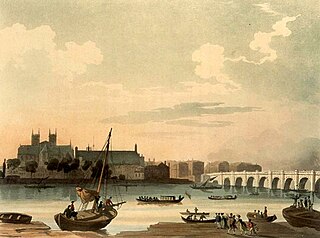
"Composed upon Westminster Bridge, September 3, 1802" is a Petrarchan sonnet by William Wordsworth describing London and the River Thames, viewed from Westminster Bridge in the early morning. It was first published in the collection Poems, in Two Volumes in 1807.

"Ode: Intimations of Immortality from Recollections of Early Childhood" is a poem by William Wordsworth, completed in 1804 and published in Poems, in Two Volumes (1807). The poem was completed in two parts, with the first four stanzas written among a series of poems composed in 1802 about childhood. The first part of the poem was completed on 27 March 1802 and a copy was provided to Wordsworth's friend and fellow poet, Samuel Taylor Coleridge, who responded with his own poem, "Dejection: An Ode", in April. The fourth stanza of the ode ends with a question, and Wordsworth was finally able to answer it with seven additional stanzas completed in early 1804. It was first printed as "Ode" in 1807, and it was not until 1815 that it was edited and reworked to the version that is currently known, "Ode: Intimations of Immortality".
"London, 1802" is a poem by the English Romantic poet William Wordsworth. In the poem Wordsworth castigates the English people as stagnant and selfish, and eulogises seventeenth-century poet John Milton.
"The World Is Too Much With Us" is a sonnet by the English Romantic poet William Wordsworth. In it, Wordsworth criticises the world of the First Industrial Revolution for being absorbed in materialism and distancing itself from nature. Composed circa 1802, the poem was first published in Poems, in Two Volumes (1807).

The Lucy poems are a series of five poems composed by the English Romantic poet William Wordsworth (1770–1850) between 1798 and 1801. All but one were first published during 1800 in the second edition of Lyrical Ballads, a collaboration between Wordsworth and Samuel Taylor Coleridge that was both Wordsworth's first major publication and a milestone in the early English Romantic movement. In the series, Wordsworth sought to write unaffected English verse infused with abstract ideals of beauty, nature, love, longing, and death.
An Eton Poetry Book is an anthology edited by Cyril Alington and George Lyttelton, with an introduction by A. C. Benson. The editors' intentions were "to provide poems which boys might reasonably be expected to like" and "to awaken their metrical sense." The book was published in 1925, with a second impression in 1927 and a third in 1938.

The Feast of the Poets is a poem by Leigh Hunt that was originally published in 1811 in the Reflector. It was published in an expanded form in 1814, and revised and expanded throughout his life. The work describes Hunt's contemporary poets, and either praises or mocks them by allowing only the best to dine with Apollo. The work also provided commentary on William Wordsworth and Romantic poetry. Critics praised or attacked the work on the basis of their sympathies towards Hunt's political views.